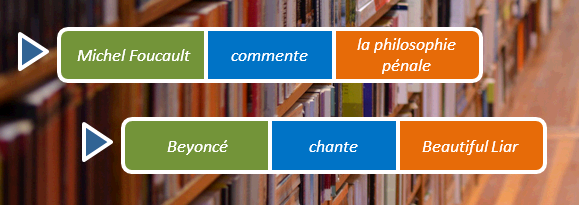Open Information Extraction
Since 2013, part of the research efforts carried out by Philippe Langlais and his team at RALI have focused on Open Information Extraction (OIE). The aim of this research area is to extract structured knowledge from unstructured, free text.
In other words, the goal is to enable computer systems to acquire knowledge from texts written in natural language. These facts typically take the form of triplets (or tuples), for example (Justin Bieber, was born in, 1994). This is a crucial first step for the semantic integration of various knowledge sources, and for the creation of rich and easily explorable knowledge bases.

Endowing computers with implicit knowledge of the world is the motivation for several research programs such as the Common Sense Computing Initiative (MIT) or NELL (CMU), for English, typically.
Results
With the defacto project (2014-2018), RALI modified ReVerb so that it could process French and extract simple facts from French Wikipedia. The French version of ReVerb is available on GitHub. High-level concepts were extracted from this data and then linked to instances in the corpus. In order to visualize the results, this knowledge was arranged in the form of an interactive graph using Gephi and Sigmajs Exporter.
After extracting millions of facts from Wikipedia and the scholarly corpus Érudit, we designed an entity classifier based on the relationships these entities have with each other. We published our results at the Canadian Artificial Intelligence Conference in 2016.
The problem of anaphoras is important in Open Information Extraction. Thus, it is necessary to solve anaphoras like "he" or "the artist" by finding the entity to which these words refer. Abbas Ghaddar worked on this aspect and built several useful resources such as WikiCoref and other corpora.
Project CO.SHS
Description
In September 2016, the Canada Foundation for Innovation (CFI) announced its funding of the Open Cyberinfrastructure for the Humanities and Social Sciences (CO.SHS) project, led by Professor Vincent Larivière, holder of the Canada Research Chair on the Transformations of Scholarly Communication.
The CO. SHS project is based on the scholarly dissemination platform Érudit and the Public Knowledge Project scholarly publication software. The aim of the project is to support research in the humanities and social sciences by facilitating the production and dissemination of scholarly publications, as well as the exploration of these texts using innovative analytical and visualization tools. Several multi-disciplinary teams work together to achieve these goals.
At RALI
The project led by RALI aims to exploit the semantics present in the texts in order to augment the user experience by direct extraction of indexed facts from the texts ("Sylvain L' Espérance is a documentary filmmaker"), in order to offer a more conceptual navigation of the texts disseminated on Érudit and to respond to requests ("Who are the contemporary documentary filmmakers interested in the migrant question?) or assemble thematic fact sheets (e.g. "list of militant filmmakers").
To do this, various challenges in language processing must be met, including extracting facts from unstructured text and linking them to external knowledge bases and collections. All this should be made possible in French and English, on the Big Data that is the large corpus of the Érudit platform and other collections used in the CO.SHS project. Evaluation remains an issue, as shown by the project WiRe57.

